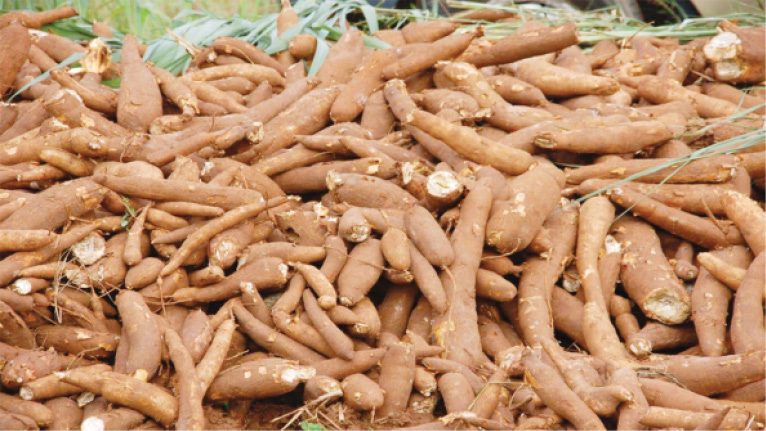Statistics from the Central Bank of Nigeria (CBN) have shown that about 2,923,937 farmers in the country have benefitted from its Anchor Borrower Programme (ABP).
The statistics further show that 3,647,643 hectares have been cultivated by farmers under the programme while 21 commodity sectors have so far benefitted.
- African youth commission, others hold carnival for orphans
- Menstrual Hygiene Day: Secondary school girls want pads made free
The APB, which was launched by President Muhammadu Buhari on November 17, 2015, is intended to create a linkage between anchor companies involved in the processing and smallholder farmers of the required key agricultural commodities. The thrust of the programme is provision of farm inputs in kind and cash (for farm labour) to smallholder farmers to boost production of these commodities, stabilise inputs supply to agro processors and address the country’s negative balance of payments on food.
At harvest, a smallholder farmer supplies his/her produce to the agro-processor (anchor), who pays the cash equivalent to the farmer’s account.
How can farmers access the loan?
A beneficiary of the programme, Mr Tunji Oladele, explained that an intending farmer must first be a member of a farming union that falls under the scheme, including Rice Farmers Association and Maize Association of Nigeria, Cassava Producers Association, Oil Palm Producers Association, among others.
Oladele, who is a cassava farmer, said banking outlets/CBN partners worked with the unions through creating accounts for the members and farmers, which enables the bank to run its checks of eligibility on prospective farmers for the loans.
He said when a farmer is found to be eligible, the loan, which usually comes in form of input package, would be given to him/her through the union he/she registered with.
Beneficiaries speak
Oladele told Daily Trust on Sunday that after accessing the loan, he was able to double his cassava farm to 4 hectares.
“You see, the problem is how to access the scheme because it is not all union members that are so lucky like some of us. However, if you succeed and you used the input judiciously under a good agronomy practices, you are bound to record a boost in production,’’ he said.
According to him, with the inputs he was able to get more produce from the farms, which in turn improved his family livelihood.
Alhaji Salihu Mohammed, a rice farmer, pleaded with the apex bank to expand the programme to cover more farmers in view of its advantage.
“When I accessed the programme, I increased my hectares of land, and honestly, the outcome was superb. However, that is not to say that some of our members who registered for the programme actually get the inputs. These are some of the challenges of the programme,’’ he said.
CBN asks bandits to embrace scheme
The governor of the CBN, Governor Godwin Emefiele, has urged bandits and those living in the bushes to drop their arms and embrace the apex bank’s Anchor Borrowers’ Programme.
He made this remark when responding to questions at the Monetary Policy Committee Meeting held last Tuesday.
The governor, who was addressing the role of insecurity in driving economic growth, explained that while the apex bank was doing all it could to stimulate growth, insecurity remained a challenge, and thus asked the bandits to drop their arms and partake in the government’s agricultural transformation programmes such as the ABP.
This is part of the CBN’s effort in assisting government at different levels to tackle the rising insecurity across the country.
Our concerns on the issue of repayment – AFAN
Alhaji Farouk Rabi’u Mudi, the newly inaugurated president of the All Farmers Association of Nigeria (AFAN), noted that the issue of poor recovery needed serious attention, as well as calculative and systematic handling.
“At times the farmers are at fault for defaulting during the recovery exercise, while in many instances, it is the system that warranted the default with or without the farmer’s intent because the farmer has been rendered helpless, and as such, he or she is left with no option than to take up what probably he doesn’t need at that point in time.
“Let me shed more light on this. This programme is being anchored by the CBN, and as a funding bank, the system seems to be a money-protection-driven system. Another issue is that professional farmers are usually not involved in the planning processes of the programme.
“Agriculture goes with a timetable. It is a time-bound activity, but you will find out that under the ABP and some other agricultural intervention programmes, inputs are usually given to farmers very late. The farmer had finished all the requirements needed in accessing such interventions, but it was given to him late; he will be left with no option than to accept the inputs irrespective of late supply,’’ he stated.

 Join Daily Trust WhatsApp Community For Quick Access To News and Happenings Around You.
Join Daily Trust WhatsApp Community For Quick Access To News and Happenings Around You.

